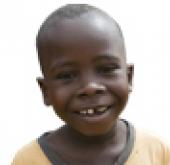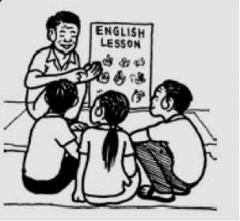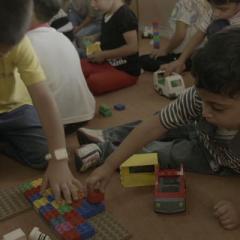Your progress
0%
The activities below can help you address the circumstances of children with disabilities and their families in accessing early childhood care and education.

Too often, the focus has been “single track”, where only individuals are targeted. This results in only a few children getting the benefit, and the system remaining exclusive. Care must be taken not to impose rigid standards of what is “normal” on a young child who is developing differently. CBR personnel can reduce anxiety in parents and children by introducing flexibility when discussing developmental milestones. Sometimes, health checks can increase exclusion instead of providing a means of finding out how children can be supported. Including health workers in CBR training will help raise awareness, improve knowledge of disability and reduce exclusion.
Learn about the types of challenges that children with disabilities faced in South-East Asia.


In one south-east Asian country, there were regular health checks for children under five years old, yet children identified as disabled received no additional support. Preschool teachers were reluctant to accept them in their classes for three reasons:
They had a strict curriculum and the child would require extra time
They could lose a salary bonus point if the child did not progress or gain weight
Only “healthy” children were meant to be enrolled, and children with disabilities were seen as being sick.
Early childhood care and learning begin at home. Therefore, family involvement is essential. Parents play a crucial role in their child’s development in the early years. Your organization can help support early learning in the home by involving families and promoting home-based activities
CBR can also provide community-based support for new parents of a child with disabilities by introducing parenting skills programmes for all new parents to learn healthy ways to parent and guide their child’s development at home.
Many practical resources can be used with family members to assist them in creating a supportive learning environment. Some examples include the following:
Different types of early childhood education opportunities are available in the community, such as playgroups, day centres and mother and child groups
CBR can create partnerships in the education sector to support a move towards child-centred, flexible learning. Such a focus would enable all children to learn effectively. Existing systems may not be structured in a way that is either inclusive for children with disabilities or effective for other children to learn.
Lasting change in the education system is formally the responsibility of government education departments. However, CBR personnel can work towards transforming the preschool environment, teaching methods and curriculum so that all children can learn more effectively. CBR is essential in order to ensure the inclusion of children with disabilities in preschools – it helps to ensure that the child has access to essential assistive devices and appropriate rehabilitation services. CBR personnel can also provide specialist input to preschools to address any particular concerns, and can demonstrate that simple strategies, such as using local resources and local people, can be of benefit to all. Preschool teachers themselves are then empowered to become advocates for a child-centred and inclusive approach.
Learn about teachers in Zanzibar who focused on the real needs of a young deaf boy in their community


In a Zanzibar preschool, teachers use basic sign language with a boy who is deaf. He uses his fingers for counting Arabic numbers, and communicates by pointing to pictures. The teachers devised a song with actions that enabled him to sing along with the class using sign language. He currently has no contact with deaf adults and sign language in Zanzibar is not well developed, but this is a start. The head teacher believes the boy’s sign language is improving and that he has learned many social skills.
Many children with disabilities can be included immediately in flexible, child-centred early childhood education settings. Sometimes, a specialist provision is required to prepare both the children and the institutions for inclusion in these mainstream settings. CBR personnel can ensure that children with disabilities have access to specialist resources and ensure that close linkages are maintained between specialist providers and mainstream education settings.
It is important to encourage the direct involvement of people with disabilities in early childhood care and education activities in roles such as advisers, trainers, managers, decision-makers and role models.
Remember that the principle of “nothing about us without us” applies equally to working with children in the early years. All suggested activities will be more relevant and effective if people with disabilities are involved. Older children with disabilities can offer support, encouragement and creative ideas to respond to the circumstances of younger children with disabilities.
Learn about how the deaf community in Coimbatore, India, came together to support the deaf children in their larger community.


In the Hambantota province in Sri Lanka, the local CBR identified a number of preschool children with learning disabilities. During the process of mapping the available services in the district, CBR also identified an international non-governmental organization that was implementing preschool programmes. The non-governmental organization showed interest in including children with disabilities in its preschools, but said that its current teachers were not skilled to do this. CBR then identified resources within Sri Lanka for providing training on inclusive education and sponsored preschool teachers from the non-governmental organization to attend.
After the training, the teachers and CBR staff met with the parents and children, and together they developed a plan for inclusion. The staff expended a lot of effort to ensure that parents were an integral part of the inclusion process, giving them responsibilities to make it a success. They also made the children already attending the preschools and their parents aware of disability issues and involved them in the inclusion process as well.
Training and awareness-raising are required for many groups if we are to shift attitudes towards inclusive education. Because of this, sessions that are flexible in form and content, and involve people with disabilities and disabled people’s organizations in their development and implementation, will be most appreciated. Some essential CBR activities for awareness-raising and training include:
Learn about CBR in Sri Lanka that helped to support teachers in training for inclusive education.


In the Hambantota province in Sri Lanka, the local CBR identified a number of preschool children with learning disabilities. During the process of mapping the available services in the district, CBR also identified an international non-governmental organization that was implementing preschool programmes. The non-governmental organization showed interest in including children with disabilities in its preschools, but said that its current teachers were not skilled to do this. CBR then identified resources within Sri Lanka for providing training on inclusive education and sponsored preschool teachers from the non-governmental organization to attend.
After the training, the teachers and CBR staff met with the parents and children, and together they developed a plan for inclusion. The staff expended a lot of effort to ensure that parents were an integral part of the inclusion process, giving them responsibilities to make it a success. They also made the children already attending the preschools and their parents aware of disability issues and involved them in the inclusion process as well.
CBR cannot transform the education system by itself. CBR personnel will benefit the people they serve by identifying partners and allies. In partnership with other stakeholders (national and local), CBR can advocate for the provision of inclusive preschool facilities. Often service providers are aware that inclusive policies or even laws exist, but are not given the help and budgetary support to implement these. CBR can, wherever possible, lobby for existing facilities to become inclusive rather than for the creation of separate facilities.
Now let’s watch a video that tells the story of how a CBR worker in the West Bank and Gaza Strip provided support to help ensure that a young boy was properly integrated into his classroom.
Select the Learn more link below to watch the video. As you watch, take note of the different kinds of support the CBR worker provides, both to Rafiq and others.
Learn about how a CBR worker in Palestine helped to advocate for a young boy with physical and speech disabilities.

Ensuring the well-being of young children is a critical element in the response to any emergency, conflict or natural disaster. CBR can help to ensure that there are inclusive child-friendly spaces and opportunities for play activities; this often means interacting with United Nations agencies as well as nongovernmental organizations and government services.